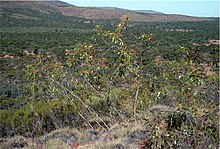Eucalyptus lansdowneana (original) (raw)
From Wikipedia, the free encyclopedia
Species of plant
| Red-flowered mallee box | |
|---|---|
 |
|
| Eucalyptus lansdowneana near Gawler | |
| Scientific classification |
|
| Kingdom: | Plantae |
| Clade: | Tracheophytes |
| Clade: | Angiosperms |
| Clade: | Eudicots |
| Clade: | Rosids |
| Order: | Myrtales |
| Family: | Myrtaceae |
| Genus: | Eucalyptus |
| Species: | E. lansdowneana |
| Binomial name | |
| Eucalyptus lansdowneanaF.Muell. & J.E.Br.[1] |
Eucalyptus lansdowneana, commonly known as the crimson mallee or the red-flowered mallee box,[2] is a species of slender stemmed, straggly mallee that is endemic to a restricted area of South Australia. It has rough, fibrous or flaky bark at the base, smooth, grey over creamy-white bark, lance-shaped adult leaves, flower buds in groups of seven, crimson flowers and barrel-shaped fruit.
flowers
flower buds
Eucalyptus lansdowneana is a mallee that typically grows to a height of 2–6 m (6 ft 7 in – 19 ft 8 in) and forms a lignotuber. It has about 2 m (6 ft 7 in) of rough, fibrous or flaky bark at the base, smooth, grey over creamy-white bark that is shed in short strips above. Young plants and coppice regrowth have broadly lance-shaped to egg-shaped leaves that are 70–100 mm (2.8–3.9 in) long and 25–35 mm (0.98–1.38 in) wide. Adult leaves are glossy green, lance-shaped, 85–155 mm (3.3–6.1 in) long and 15–27 mm (0.59–1.06 in) wide on a petiole 10–20 mm (0.39–0.79 in) long. The flower buds are arranged on both branched peduncles 3–14 mm (0.12–0.55 in) long on the ends of branchlets each branch with a group of seven buds and on unbranched peduncles in leaf axils, the individual buds sessile or on pedicels up to 3 mm (0.12 in) long. Mature buds are oval, 7–9 mm (0.28–0.35 in) long and 4–7 mm (0.16–0.28 in) wide with a conical to rounded operculum. Flowering mainly occurs between August and October and the flowers are crimson, ageing to pink. The fruit is a woody barrel-shaped capsule 9–12 mm (0.35–0.47 in) long and 7–11 mm (0.28–0.43 in) wide with the valves below rim level.[3][4][5][6]
Taxonomy and naming
[edit]
Eucalyptus lansdownea was first formally described in 1891 by Ferdinand von Mueller and John Ednie Brown in volume 9 of Brown's book, The forest flora of South Australia.[7] The specific epithet (lansdowneana) honours Thomas Lansdowne Browne, who collected the type specimens.
In 1974, Clifford David Boomsma described Eucalyptus lansdownea subsp. albopurpurea in the journal South Australian Naturalist[8] but in 2000, Dean Nicolle raised the subspecies to species level as E. albopurpurea. Eucalyptus albopurpurea has a larger, more robust habit, broader leaves, usually smaller buds and fruit and white, pink or purple flowers.[9]
Distribution and habitat
[edit]
Crimson mallee is restricted to the south western part of the Gawler Ranges where it grows in mallee vegetation on rocky outcrops and hilltops.[3][4]
- ^ "Eucalyptus lansdowneana". Australian Plant Census. Retrieved 11 August 2019.
- ^ Dean Nicolle. "Native Eucalypts of South Australia". Retrieved 23 October 2016.
- ^ a b "Eucalyptus lansdownea". Euclid: Centre for Australian National Biodiversity Research. Retrieved 1 June 2020.
- ^ a b Nicolle, Dean (2013). Native Eucalypts of South Australia. Adelaide: Dean Nicolle. pp. 194–195. ISBN 9780646904108.
- ^ "Eucalyptus lansdownea". Flora of Australia. Australian Biological Resources Study, Department of the Environment and Energy, Canberra. Retrieved 11 August 2019.
- ^ "Eucalyptus lansdownea". State Herbarium of South Australia. Retrieved 11 August 2019.
- ^ "Eucalyptus lansdowneana". APNI. Retrieved 10 August 2019.
- ^ "Eucalyptus lansdowneana subsp. albopurpurea". APNI. Retrieved 11 August 2019.
- ^ Nicolle, Dean (2000). "New taxa of Eucalyptus informal subgenus Symphyomyrtus (Myrtaceae), endemic to South Australia" (PDF). Journal of the Adelaide Botanic Garden. 19: 83–94. Retrieved 21 March 2015.

